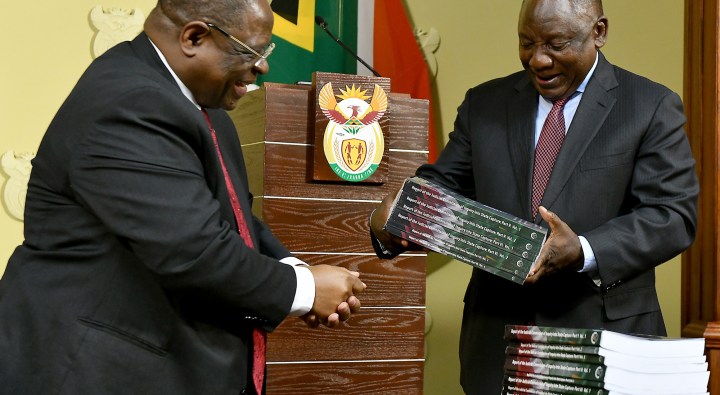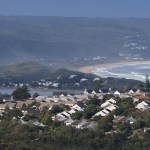ZONDO COMMISSION ANALYSIS
SOE governance recommendations gather dust while ailing Eskom, Transnet suck billions of rands

Aside from recommendations on prosecuting board members, executives and others at state-owned enterprises (SOEs) implicated in State Capture — and not just Eskom — declaring directors delinquent and recouping money, the Zondo Commission also recommended fundamental shifts in the governance of SOEs. Little seems to have happened.
In June 2022, the State Capture Commission chaired by now Chief Justice Raymond Zondo didn’t mince its words in a series of findings and recommendations about SOEs which ranged from armaments entities Denel and Armscor, state diamond miner Alexkor, passenger rail agency Prasa and public broadcaster the SABC to Transnet and Eskom.
The recommendations on improved governance, such as transparent appointment processes and criteria alongside persistent monitoring and controls, were aimed at ending and ensuring there was no repeat of State Capture at SOEs through pliant boards and executives.
The Zondo Commission argued it must “insist on a truly independent and transparent process free from political manipulation”, so when a minister makes SOE appointments they must be based on merit.
When the commission completed its task in June 2022, it pointed out, “There are no effective mechanisms which would prevent cronyism and cadre deployment from continuing to dominate the appointments to the boards and to senior executive officers [posts].”
Fast-forward to October 2023, and little has changed.
Draft legislation
Talk of a new shareholder management model — or how the relevant ministers interact with the SOEs in their portfolio — goes back to at least mid-2017 with the 14-point plan by the then finance minister Malusi Gigaba. However, the Department of Public Enterprises in 2023 has taken a different tack in its National State Enterprises Bill.
This draft SOE legislation establishes a state asset manager holding company, with the President as the sole shareholder, who appoints and dismisses board members in addition to determining their salaries. Although the President may delegate this responsibility to a Cabinet minister, this provision underscores the increasing centralisation of power in the Presidency.
The board appoints the CEO after consulting with the shareholder (the President), according to section 7(7), and submits the annual report and financial statements to the shareholder.
A board member “must act in the best interests of the company taking into account its long-term business sustainability, public interest and developmental objectives”, according to Section 9 of the draft Bill.
None of this correlates with years of discussions about a shareholder management Bill to regulate how the government and the boards of SOEs should relate to each other, while strengthening the “political-administrative interface”, in effect keeping ministers out of operational matters.
Zondo’s recommendations
The National State Enterprises Bill falls short of all the Zondo Commission recommendations for transparent, accountable appointment processes and continued independent monitoring.
For this, the commission recommended a standing appointment and oversight committee that would host transparent appointment criteria and processes, including independent public nominations, for appointing SOE boards and executives.
The appointment and oversight committee was to be headed by a retired judge and to include the National Economic Development and Labour Council (Nedlac), representatives from the auditing and legal professions, a ministerial representative and one of the relevant SOE sectors,
This committee would recommend names for appointment to SOEs to the relevant minister and also develop a code of conduct.
On the upside, new public procurement legislation is now before the Standing Committee on Finance, and the trade, industry and competition committee is processing draft legislation to amend the Companies Act to extend the timeframe for directors to be declared delinquent, on social and ethics committees and more to stave off private sector State Capture abuses.
But the Zondo Commission also recommended an anti-State Capture and Corruption Commission to investigate and “publicly expose” such instances.
This was necessary, according to the Zondo Commission, because “the failure of Parliament to hold the executive to account, particularly [former] president [Jacob] Zuma … contributed to the Gupta-Zuma State Capture”. Because of such conduct, the anti-State Capture and Corruption Commission should also keep an eye on “how Parliament performs its oversight function” and step in to investigate itself if the national legislature fails again.
That may well be a long-shot recommendation, but it’s not without basis.
Governance malfunction
The parliamentary public enterprises committee is understood not to have summoned Eskom, Denel or Alexkor over their failure to submit their annual reports and audited financial statements by the statutory deadline. Audit issues were cited in Public Enterprises Minister Pravin Gordhan’s letter to Parliament on 29 September to explain the delays.
The recent resignations of top executives from Transnet and of chairperson Mpho Makwana from Eskom highlighted continued fractious governance, including claims of ministerial interference.
Such failures and developments point to governance malfunction.
Yet, much is at stake, given the state logistics SOE Transnet’s R130-billion debt and the R254-billion bailout the state power utility Eskom received in the February Budget, about four years after the 2019 Budget allocated R23-billion a year for a decade in addition to the R69-billion over three years.
Parliament’s public enterprises committee had little to say in its draft budget oversight report, even after noting that Public Enterprises had failed several performance targets, such as signing shareholder compacts with Eskom.
“Government will also reduce the continual demands on South Africa’s limited public resources from state-owned companies. For this reason, SOCs need to develop and implement sustainable turnaround plans… Their future will be informed by the value they create and whether they can be run as sustainable entities without bailouts from the fiscus,” the report noted.
It’s a long way from the Zondo Commission’s recommendations about SOE governance and procurement reform recommendations, and its call for Parliament to ensure qualitative — not just ticking the boxes — oversight and accountability. DM

















Comments - Please login in order to comment.